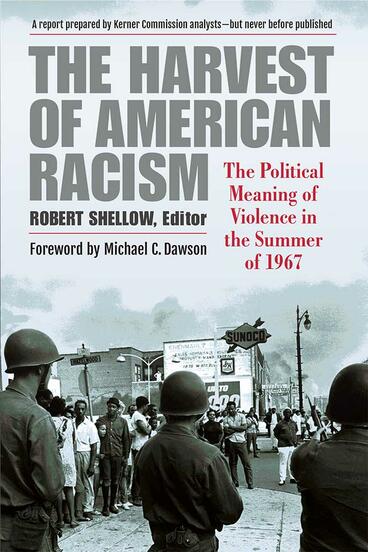The Harvest of American Racism
The Political Meaning of Violence in the Summer of 1967
In print for the first time--the document that the Kerner Commission did not want to see released
Description
In the summer of 1967, in response to violent demonstrations that rocked 164 U.S. cities, the National Advisory Commission on Civil Disorders, a.k.a. the Kerner Commission, was formed. The Commission sought reasons for the disturbances, including the role that law enforcement played. Chief among its research projects was a study of 23 American cities, headed by social psychologist Robert Shellow. An early draft of the scientists’ analysis, titled “The Harvest of American Racism: The Political Meaning of Violence in the Summer of 1967,” provoked the Commission’s staff in November 1967 by uncovering political causes for the unrest; the team of researchers was fired, and the controversial report remained buried at the LBJ Presidential Library until now.
The first publication of the Harvest report half a century later reveals that many of the issues it describes are still with us, including how cities might more effectively and humanely react to groups and communities in protest. In addition to the complete text of the suppressed Harvest report, the book includes an introduction by Robert Shellow that provides useful historical context; personal recollections from four of the report’s surviving social scientists, Robert Shellow, David Boesel, Gary T. Marx, and David O. Sears; and an appendix outlining the differences between the unpublished Harvest analysis and the well-known Kerner Commission Report that followed it.
“The [Harvest of American Racism] report was rejected by Johnson administration functionaries as being far too radical—politically ‘unviable’… Social science can play an extremely positive role in fighting racial and other injustice and inequality, but only if it is matched with a powerful political will to implement the findings. That will has never come from within an American presidential administration—that will has only been forged in black and other radical communities’ movements for justice. The political power for change, as incremental as it has been, has come from within those communities. Washington responds, it does not lead."
—from the Foreword by Michael C. Dawson
Psychologist Robert Shellow was Research Director for the National Advisory Commission on Civil Disorders. He later directed a pilot police program for the Washington, DC, Department of Public Safety and taught at Carnegie Mellon University, before starting his own consulting business.
Cover: Detroit, July 1967. Photograph from the Tony Spina Collection courtesy Walter P. Reuther Library, Wayne State University.
Reviews
“In the summer of 1967 the Kerner Commission hired a team of social scientists to explain the cause of the riots that had engulfed dozens of American cities. Their report, The Harvest of American Racism, was so controversial that the commission staff ordered it destroyed. Now, Robert Shellow and his team have published Harvest, along with insightful and revealing essays that provide appropriate context and perspective. This is an important book that is as relevant today as it was five decades ago.”
—Steven M. Gillon, author of Separate and Unequal: The Kerner Commission and the Unraveling of American Liberalism
“In 1968 the Kerner Commission concluded that cities across the nation had been erupting because blacks were frustrated with the slow pace of racial and economic equality. It turns out that the Commission had been presented with a far more radical analysis of those urban uprisings, in an extraordinary report called The Harvest of American Racism. This report was not only ignored, but actively suppressed. Now black rage is once again rocking our nation’s major cities, and it is past time that we take a close look at what policymakers dismissed 50 years ago. As the Harvest report made clear, those who took to the streets in 1968 weren’t merely frustrated and filled with despair. They were politically engaged, they believed that racial oppression’s root causes must be addressed rather than its surface expressions, and they would never stop erupting until change really happened. The Harvest of American Racism is a must-read, as relevant today as it was 50 years ago.”
—Heather Ann Thompson, Pulitzer-Prize winning author of Blood in the Water: The Attica Prison Uprising of 1971 and Its Legacy
“This seminal study from the 1960s provides a hard-hitting and insightful look at the roots of racial discrimination of the United States. Jettisoned by the Kerner Commission for something less radical, this eye-opening analysis still speaks volumes in our current age.”
—Julian E. Zelizer, Malcolm Stevenson Forbes, Class of 1941 Professor of History and Public Affairs, Princeton University, and CNN Political Analyst

